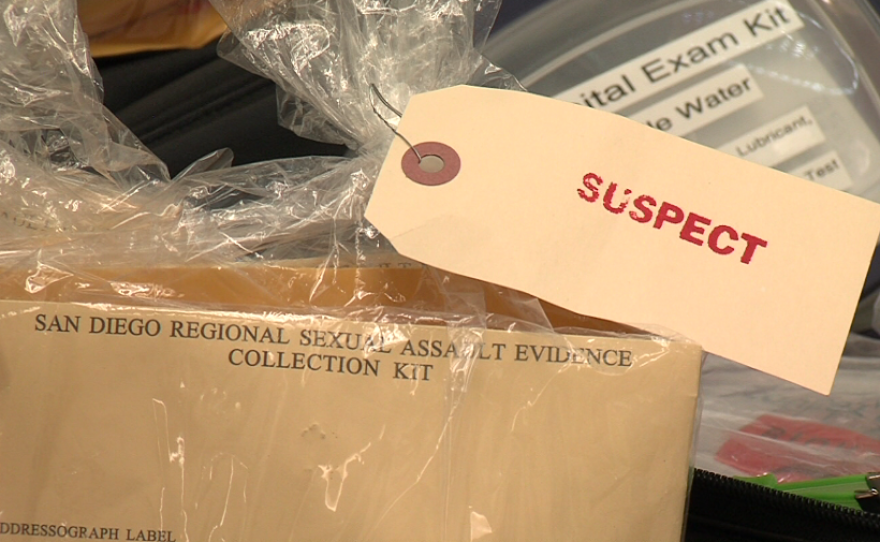This non-descript building just blocks away from the old Palomar Hospital in Escondido gives little indication of what goes on inside.
People suspected of being battered or sexually abused arrive accompanied by a police officer. They meet with specially trained professionals, and they can count on two things: A comprehensive yet considerate exam process — and strict privacy.
Crystal Harris was examined in 2008 at the Palomar Forensic Center after an incident with her husband.
“Everyone kind of knows intellectually that those type of places exist and that’s where women are taken," Harris recalled. "But it’s the type of place where you never think you’re actually gonna be.”
Thanks in part to evidence collected at the forensic program, Harris's ex-husband was tried and convicted of a felony sex offense. Harris said the forensic program’s one-on-one approach was comforting.
“They don’t make you deal with a lot of people. They know that’s overwhelming. So they don’t make you deal with a lot of people, and I think that’s good," she said.
Last year, the program saw 200 adults and 350 children. Patty Secor, one of the program's sexual assault nurse examiners, explained the process.
“When they come here, we have them come into a waiting room," she said, showing a visitor a waiting area filled with chairs and some stuffed animals. "This is set up for children, because we do a lot of children at this facility.”
The forensic interview, where patients describe what happened to them, is a crucial part of the process.
Children under 14 are interviewed in a special room. Their conversation is recorded through a two-way mirror from an adjacent room, where police and a representative from the District Attorney’s Office sit. Investigators trained in the techniques and challenges of obtaining truthful statements from children, she said, conduct the interviews.
Adults are interviewed in a separate space. Secor explained that all potential victims are also given thorough medical exams. She held a large manila envelope that contained the tools of the trade.
“This is a sample package that we receive from the crime lab that has the equipment we need to do a regular sexual assault exam," Secor said. "It comes with swabs. These are what we use to collect evidence from various parts of the body.”
Secor pointed out what staff learn from the interview often determines the focus of the exam.
“If they tell me that it was not a full sexual assault, I would need to know exactly where on their body I’m going to look for evidence," she said. "Sometimes they say they have a bite mark, sometimes they tell me they have bruises or bodily injuries.”
In a separate exam room, Secor used a black light to aid in her search for physical evidence.
“By looking at their entire body, head to toe, we are able to see if there are any signs of semen or saliva," she said.
All parts of the body where suspected injuries occurred are photographed.
Secor says it’s tough working with assault survivors. They’re often emotional wrecks.
“Personally, I can keep doing this work because I cannot have stopped what happened to that victim," she explained. "My whole goal is to hopefully hold somebody accountable for what they did to that person.”
The exam and interview are designed to be thorough. The goal is for the adult or child to tell their stories once. And staff say that in interviews with children the key is to keep an open mind.
Cathy McLennan, who directs the Forensic Center’s Child Abuse Program, conducts many of the interviews with children.
“Although I have information about what the allegation is going in to talk to the child, it cannot drive the course of that interview," she said. "I’ve got to consider that. There may have been misunderstandings about something, that the child’s behavior does not necessarily mean there has been abuse, but that that’s a possibility.”
McLennan is frequently called to testify in court. She often feels nervous.
“And I’m thinking about, 'Gee, I wish I didn’t have to be here, didn’t have to testify,'" she said. "And then the child will come out of the courtroom. And he or she has just testified, and they’re like this tall. And I think, 'wow, I mean, talk about courage. I guess I’m just gonna man up and go in there and do it.'”
Child sexual abuse and adult rape cases in North County are handled at the Superior Court in Vista.
Deputy District Attorney Tracy Prior said the Forensic Services Program has been instrumental in getting convictions.
“The work of the Forensic Center and the Child Abuse Program is directly related to our ability to hold rapists accountable and child molesters accountable," Prior said.
The District Attorney’s Office files about 600 felony sexual assault cases each year in North County. Thanks in part to evidence collected at the forensic program, the office reports it has achieved a 93 percent conviction rate.
Palomar Health was forced to withdraw its financial support for the program this year. The county and the private Golden Door Foundation came to the rescue.
The forensic program is hoping to expand that kind of public/private partnership to ensure its long-term financial future.






